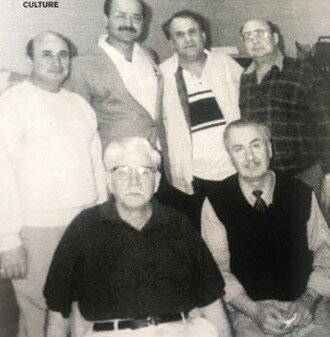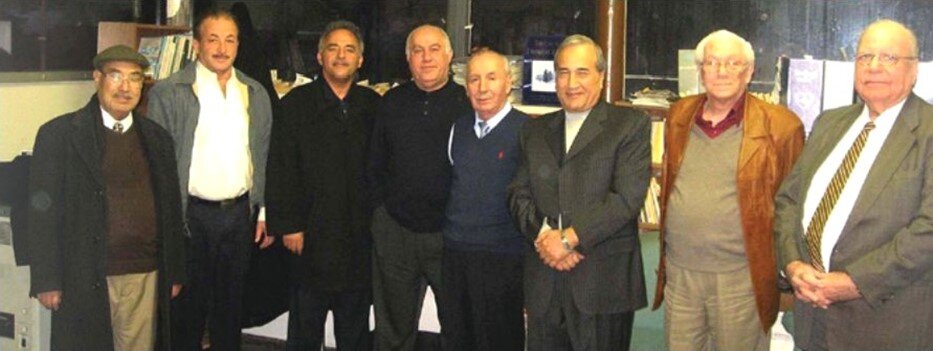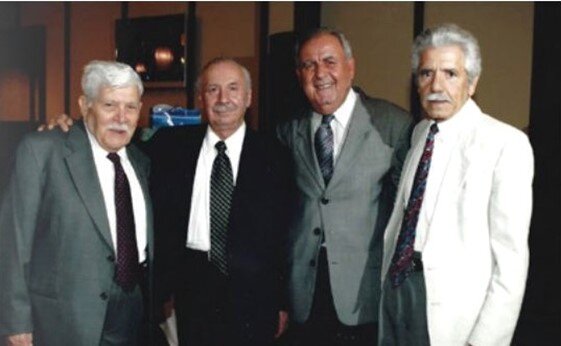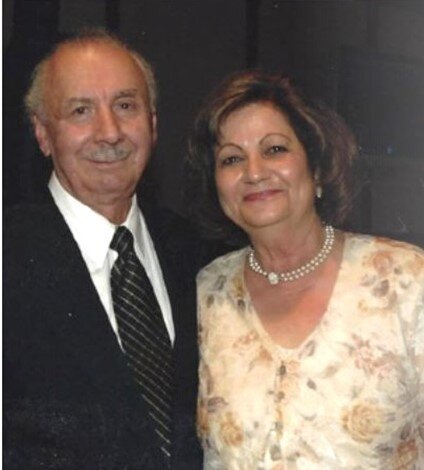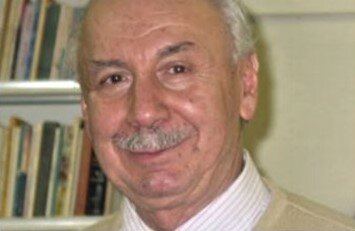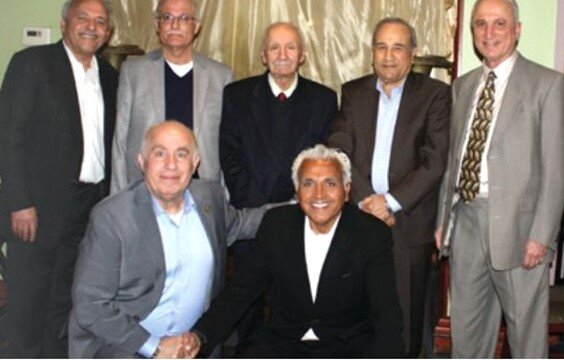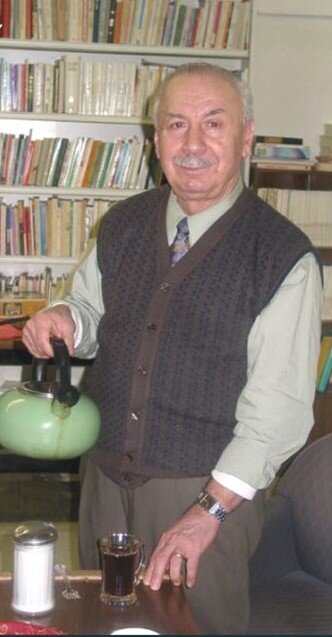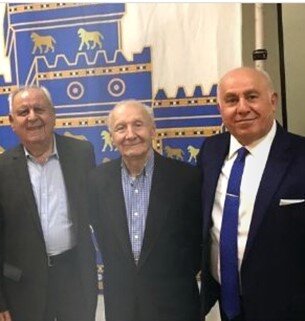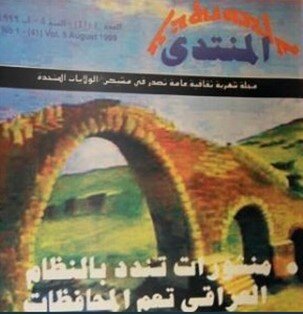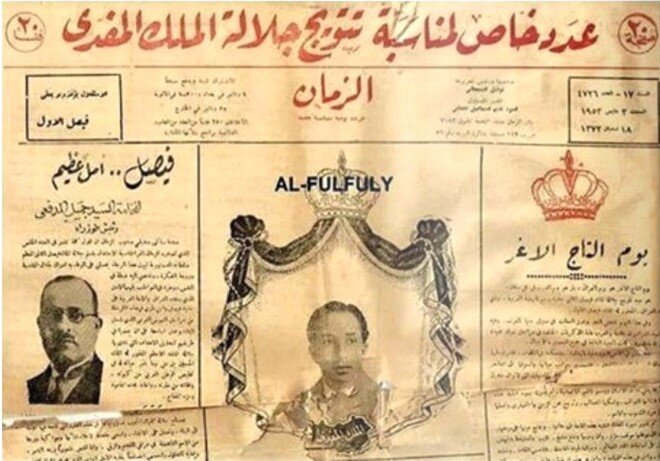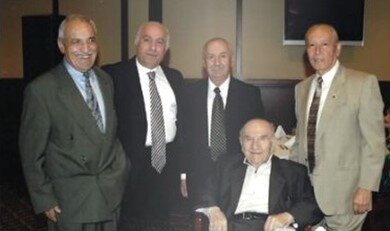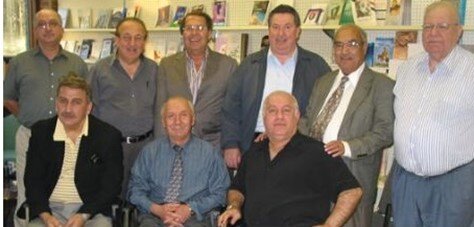A Journalists' Journey: Fouad Manna (Abu Gibran) Part II-USA
By Adhid Miri
In part two of this story, we continue our travels in the new world and cover the experiences, the challenges, the ups and down, special situations, the humor, the temper, and the characters that make it so colorful and memorable.
Journalism in the New World
The machine noise, the smell of ink, coffee, and cigarettes up late at night and the joy of bringing forth a new issue of the newspaper while working in Baghdad were memories Manna held close upon setting foot in the New World. With thoughts only of survival and obligations to support his family, he initially postponed his true career interest.
Fouad worked first at a local Coca-Cola factory alongside 20 other Iraqi workers, but not for long. It seems that this beginning shaped his future thinking and accelerated his upcoming projects. Manna says, “I could not stay far from the press, especially after I knew closely about the sad reality of the press within the Iraqi Chaldean community.”
Two Iraqi immigrant newspapers were published in 1970 in Detroit. The first was Al-Mashriq, “The Sunrise,” published by Hanna Yatouma. This publication was mainly concerned with the social matters of the community. Manna used to write about various topics and send them articles from Baghdad. The second paper was the "New World" published by Yousif Antoun.
Manna shares, “I had an overwhelming desire to establish a new newspaper in the diaspora; to be its owner, its editor-in-chief, and be independent from all outside influences whatever they were.” So, the Al-Hadaf was born and issued.
Al-Hadaf “The Objective”
The Al-Hadaf weekly newspaper was first published in Detroit in September 1970. Its offices were located on 7-Mile Road near the Sacred Heart Church between John R. and Woodward Avenue. It focused on cultural, social, and political areas of interest. Eight issues were printed at the print shop of Muhammad Kharroub, who owned a linotype printing press.
Later that same year, Manna decided to purchase his own printing press. Fouad notes, “The first of my many problems was to find the Arabic letters, and I was fortunate to find those letters (rough and soft) in New York City through two newspapers - Al-Islah and Al-Huda, owned by ex-priest Alphonse Schores. These letters were expensive but important to complete the work.”
The weekly work continued at Al Hadaf newspaper until 1976. It was a meeting place every Saturday for Bishop (then Father) Georges Garmo Sliwa, Jamil Sulaka, Yousif Nadhir, Shamasha Assou, Joe Najor, Ghazi Shaffo, Moayyed George, Razzouq Kassab, and Georgette Sesi.
Other late visitors were Hickmat Atto, Talal Samouna, Ghanim Al-Qarawi, the Putrus brothers Samir, Sabah, and Adil, Mwafaq Sitto, Sabah Summa, Adil Akrawi, and others.
One of the incidents that Manna cannot forget occurred in the early seventies when mercenaries of the Baath in Detroit contacted him and offered a large amount of financial aid to support his magazine, in exchange for his support for the policy of the Baath in Iraq.
Manna was subjected to many intimidations by the regime’s agents deployed among the Arab expatriates. He remained steadfast and unaffected by the hostile foes and refused to bend his principles and bow his head to them. He went on to expose their policies, agents, and the corruption dollars which were being distributed here and there in Detroit.
“Truthfully, had it not been for the existence of the Iraqi Democratic Union in Detroit,” says Manna, “and its honorable stand in the early 1980s against the Baath Party, and the lessons it taught to its agents within our community, the Ba'athists would have been dominant to this day within the Iraqi community in Detroit.”
By 1978, Fouad was the editor-in-chief of Al-Rabita, “The League Newspaper,” working with a group of intellectuals from the Chaldean community. It described itself as "a comprehensive political and cultural newspaper.” Only 8 issues were published.
In 1980, Manna partnered with Adel Akrawi, Amer Dado, and Salah Corrie to start the publication Voice of the Free Newspaper, the mouthpiece of the Iraqi Progressive Democratic League. Says Manna, “We published 8 issues directed at Ba’athists, Saddam Hussein and their mercenaries in Detroit.”
In 1986, in cooperation with Youssef Nadhir, Fouad joined Al-Ruwad, “The Pioneers” magazine. “I helped publish 4 issues before moving on,” recalls Manna.
In 1987, Al-Hadaf newspaper resumed circulation for a short period.
The Burning of Al-Hadaf
Phillip Rice of the FBI called Abu Gibran asking him, “Do you know Dawood Khami? He has received a post card from Moscow. Is he a spy? Is he KGP?”
“Come to a meeting at this address.” Abu Gibran called a Palestinian attorney who advised him not to go, it could be a trick. So, he did not show up. Half an hour after the appointment time, the agent called again and asked, “Why did you not show up?” Abu’s answer was, “If you need anything, come to the print shop.” The agent did and showed his badge. After a quick search, he asked, “Do you know John (Hanna) Yatouma? He is your friend, a local communist and has a newspaper.”
I asked him who told you. The priest? Next day and intimidated by the FBI visit, Abu Gibran wrote a critical editorial and received a threating call stating that the print shop will be shut within 3 days!
Two weeks later the print shop was burned to the ground by three suspects (Johnny Mafia, and two others). Johnny Mafia was the mastermind; he was sentenced to 7 years in jail but fled to Iraq after posting bail. The group gave $100 to an African American man (Mike Johnson) to finish the job. Johnson and was caught burning the store of Naiem Yatouma and confessed to the other crime as well. Manna did not have insurance at the time, and this was a huge loss and financial setback. The FBI agent investigating the case disclosed that the priest was behind the arson.
Yousif Nadhir wrote a blazing article about this arson entitled “The coward burns Al-Hadaf print shop”. The article added flame to the fire and caused a major stir.
Al- Muntada - The Forum
In 1994, the first issue of the magazine (Al-Muntada) was published and focused on literary, cultural, social, and political fields. It encouraged new writers of both sexes to participate and write in the new publication.
A host of writers contributed articles, poetry, and sciences to the publication among them:
Bishop Gorgies Garmo, Joseph Nadhir, Father Emmanuel Rayes, Fadhil Moussa Pola, Hanna Kalabat, Hikmat Atto, Talat Misho, Yousif Arabo Al-Numan, Ghazi Shaffo, Saeed Shamaya, Zakki Eram, Yousif Kinaya, Sabah Sadiq, Khalid Al-Maqdasi, Mazin Ayoub, Anan Bidwid, Falih Hasoun Al-Daraji, Ibrahim Zobaidi, Adhid Miri and many others.
The late Adel Akrawi played an important role launching the publication and funded the first three issues. He also contributed to paying the first installments of computers that we used for typesetting. Al-Muntada continued until the year 2009, when it ceased publication after electronic reading dominated the reading world.
The existence of an independent physical building for the print shop, the presence of dedicated newspaper staff, and the support of broad social relations provided fertile grounds to attract intellectuals, activists and politicians to the Al-Muntada salon and away from the community social cafes. This group needed a suitable environment for dialogues, conversations, and free-spirited discussions. This place became an alternative and center for many among the community educated and interested people.
The beginnings were founded with the launch of (Al-Hadaf Magazine) in the fall of 1970, when we (the magazine staff) began to meet every Saturday evening for dialogue, debates, and conversation, and I remember them: Yousif Nadhir, Jamil Sulaka, Deacon Youssef Najjar, Ghazi Shafu (Abu Shuruq), Moayyed George, Wilson Kassab, Georgette Sesi and Razzouk Kassab. I am happy to say that the days of those memorable sessions are still printed in my mind to this day.
“I was never bothered by the tense discussions or the high degree of their intensity. I was happy to be among the best intellectuals of the community that gathered under the roof of the "Al-Muntada" magazine. These Saturday sessions developed a lot after the year 1994 as politics entered the scene and the Al-Muntada was opened to broader range of Iraqi dignitaries who were visiting Detroit and honored us by their presence in our Saturday meetings.”
Over time, the (Al-Muntada) site turned into a constant, lofty and well-known landmark, not only for expatriates, but also those coming to "Michigan" from Iraq, other states or Arab countries, so that everyone who comes to America gets to know the community, visit the (Al-Muntada) and learn an experience worthy of love and respect.
Some of these individuals are at the forefront of the Iraqi political scene, including: Dr. Faleh Abdul-Jabbar, Dr. Faieq Butti, Hamid Majeed Musa, Dr. Barham Salih (current Iraqi President), Dr. Fuad Maasum (former Iraq President), the poet Mudhafer Al-Nawab and Dr. Ahmad Al-Chalabi.
The concept of routine weekly meetings at the Al-Muntada became very popular, and became recognized as a distinct gathering of intellectuals, a hallmark of the cultural events and political activities in Detroit.
The attendants were an amazing mix of professionals, writers, artists, intellectuals, and even the unemployed who met and discussed ideas in all fields and directions. It was truly like an educational classroom and an opportunity for many to learn the principles of civil debates and the styles of different dialogue processes (albeit in the Iraqi way). But what distinguishes it most was the group would return the following Saturday to continue the dialogues in a fraternal spirit again.
I had few house rules and prohibitions for these sessions. First, personal transgression should not take place under any circumstance. Second, all discussions must be conducted with respect, and that no (Baathist) can step inside these doors, regardless of rank, status, position, or privilege.
As for the permissible, there were no limitations, and I was not concerned about preparing the place for every session or cooking meals for all these loved ones. No one left Al-Muntada hungry, food, sweets, fruits, and drinks were in ample supply, many varieties were brought from home or markets. There were home favorites such as Abu Hazem’s Kubba or Issam Bacall’s Piqoota. (Need quotation marks if direct)
“The atmosphere was so friendly and intimate that I became addicted to it, and if one of the regulars went absent for a week or two, we would launch an investigation and do all we can to find the reasons. What united us was our love for Iraq, our attachment to our culture, the principles of freedom and hope for a better future away from dictatorship and dark ages policies.”
Al-Muntada According to Ibrahim Al-Zobaidi
Iraqi writer and media man, Ibrahim Al-Zubaidi was affected by the experience of the Al-Muntada, and he mentioned it in 2006 within his book entitled (Without Place, 29 Years Outside Iraq). He referred on page 111 of the book to the Al-Muntada's experience by saying,
“I became acquainted with the "Al-Muntada" group shortly after my arrival in "Michigan". For more than twenty years, educated Iraqis have gathered to issue a general cultural magazine called "Al-Muntada". And by the strenuous determination of the well-known Iraqi journalist and politician Fuad Manna “Abu Gibran” and his companion, journalist, and satirical writer Ghazi Shafu “Abu Shurooq”, Mazin Ayoub, Amer Jamil, Talal Samona, Atheer Karmo and several other Iraqi community intellectuals.”
They were a mix from the far left to the far right, separated by religions and sects, but brought together by opposition to dictatorship plus and pure and steadfast patriotism. The magazine "Al-Muntada" came to light in 1994 and continued to be published until December 2007.
During those years, neither snow or summer, or any other circumstances prevented the group from continuing the rituals of these meetings. The group consisted of a diverse bunch of Chaldeans, Assyrians, Syriacs, Mandeans, Christians, Shiites, Sunni Muslims, Arabs, Kurds, Turkmans, Armenians, the religious right, and the secular leftists. Among them were academics, doctors, journalists, store owners, workers, engineers, merchants, tailors, and the poor.
All of them would leave their peculiarities s outside and enter the sacred zone in a pure spirit far from racial, sectarian, and religious fanaticism. Typically, one attendee would raise an issue for discussion while a second moderated the session. Discussions moved between the serious and the comedic with intensity and shouting at times.
The magazine that was printed at the expense of "Abu Gibran", and in his private commercial printing press, was not just a magazine, but turned into a real Al-Muntada. Every Saturday, those who wished to attend gathered without prior appointments. Each attendee carried something with him, either a specific meal, a drink, fruits, or a sweet tray. These gifts were all placed on small tables that are laid side by side to become one table around where the "Al-Muntadas" gathered, and they exchanged reassurance About health, condition, and business, until someone raised an issue for discussion.
Political views
We asked Abu Gibran if he had ever belonged to the left, and he replied, “I grew up in a family environment that included many political activists within its members, some were martyred, others were arrested and few of them died.”
“The fifties and sixties were years of political turmoil in Iraq. When I entered the world of journalism, the profession brought me closer to some of the best intellectuals and politicians, and as Printing Press workers we were in a difficult, unenviable position on the eve of every political change.”
“This is how I got acquainted with the Iraqi left, and I say it sincerely, that I have great respect for them. From this movement came the best nationalists and the best fighters who sacrificed themselves for the nation, and the situation continues to this day. Wherever the Iraqi left is present, there you find intellectuals, poets, writers, and politicians.”
“And because this answer was diplomatic, I wanted to know more of it. In the general classification, I am biased towards leftist general thought, and I think that it is the best thought produced for humanity. It calls for equality, social justice, and freedom. “
Al-Muntada Regulars
This was a place like no other. One cannot talk About the cultural salon (Diwan) and its star Abu Gibran without talking about the friends that orbited in his sphere over the years. There were many colorful characters at different stages during Al-Muntada years:
1- (Old timers) Bishop George Garmo, Bishop Ibrahim Ibrahim, Yousif Nadhir, Shamasha Joe Najor (Uncle Joe), Jamil Sulaka, Saieb shouniyyah.
2- (Regulars) Ghazzi Shaffo (Abu Shirooq), Massoud Hawrami (Abu Azad Mr. 17%), Wilson Kassab (Abu Henry), Mazin Ayoub, Adil Bacall, Issam Bacall, Talat Misho, Talal Samouna, Annan Bidawid, Fouad Zora, Kamal Yaldo, Samir Kashat, Qieyo Qiryakos Akash (Abo Hazem), Nabil Bidawid, Ramzi Kas-Korkis, Dr. Atheer Karmo, Namir Kitto, Dr. Adhid Miri.
3- (Visitors) Fadhil Pola (Abu Alabbas), Hamid Tomeka (Abu Ammar), David Barno, Dr. Nouri Mansour, Yousif Arabo Al-Numan, Hikmet Jajjoni (Abu Hawa), Abud Kas-Korkis, Dr. Shakib Halabu, Jacob Bacall, Jasim Rizzouqi, Sabah Summa, Iraq Soccer Captain Abid Kdhum , Badri Al-Tai’ie (Abu Wassan), Eddie Putrus (Abu Ammar), Ghanim Akrawi, Raad Kathawa, Jack Zia, Salam Aboona, Hikmat Atto, Dr. Nouri Mansour, Amir Jamil, Imad Dhia Al-Khirsan (Abu Ahmmad), Ramzi Jiddo and, Dr. Radhi Abdil-Nabby, Sarmad Yousif Rizq Allah, Giberal Yousif Abuna.
4- Iraqi Presidents Barham Salih, Fouad Ma’asoum, Politicians Ahmmed Al-Chalabi, Imad Al-Khirsan, Ibrahim Al-Zubaidi, Dr. Faieq Butti, Hamid Majeed Moussa, Ghazwa Al-Khalidi, Shammim Rassam. Falih Hasson Al-Daraji,
The green zone
Way before the invasion of Iraq in 2003 and establishment of the green zone for high value government buildings and ministries, the printshop had its own green zone corner that was appropriately furnished with green sofas and pastel chairs.
This place was usually reserved for visiting dignitaries like the bishop, politicians, poets, artists, wedding prospects and paying customers.
The Cuisine and the Guests
There was no standard or safe kitchen in the print shop, yet it produced some of the most delicious food one can ever taste. Curry, Gurgur with Lamb Akouss, Red Rice and sautéed Lamb chops were the house specialty. Homemade yogurt (Labban) especially made by Abu Gibran was a delight to have plain or Shannina Yogurt. The yogurt recipe was also a well-guarded secret, but no one cared. Abu Gibran did not disclose to anyone the art of making his Iraqi Yougurt (Labban) or cooking secrets!
Al-Muntada was a place of shared responsibilities. It was a well-known that Manna, taught Annan - tea making, Abo Shirooq -writing, Ramzi Kas Korkis- slicing watermelon, Wilson Kassab - making Salad, Jihad (John) Yousif- making chickpeas-Lablabi.
Talal Samouna was the group taster and eater. His happiness at serving time was clear for all to see and usually accompanied by an Iraqi Maqaam and song. Abu Azad, Abu Shirooq and Abu Henry were the other trio tasters.
Memorable Moments
We all love a good trip down memory lane. Things end but memories last forever and are timeless treasures of the heart. Some memories are simply unforgettable. Sometimes all it takes is a conversation, or an article to evoke an old memory, making you feel like you are back in time in that moment where it was created.
Shared moments make us smile. They make us rejoice as we share experiences with each other. Simply speaking, they are relationships and times that make us happy together. We have many such moments that are full of humor and temper to celebrate with Abu Gibran:
The First Article in the USA
The first shot at Journalism in the USA 40 years ago was with Al-Hadaf (the objective), in it he published an editorial criticizing the church and the administration of Patriarch Paolus Shaikho the 2nd (who was originally from the village of Al-Qoush) stating he was short sighted!
The news quickly traveled to Baghdad on day one, and an unknown man with a distinct Alqoushi accent called Abu Gibran threating and stating, “Fouad Manna, son of so and so, are you perpetuating the fiction that our Patriarch is blind? Pa (WOW in Chaldean), I am an Alqoushi and on my way to burn you, your office, and the newspaper.”
On the phone or face to face, one can dare to threaten Abu Gibran. He told the caller, “If you are twice the man you claim to be, I dare you to show up and furthermore, so and so profanities go to you, to your patriarch and to your Alqoush!”
After two or three whiskey drinks from the store inventory, Abu Gibran took his shot rifle and sat in his car waiting for the Alqoushi intimidator! A police officer circulating the area, noticed him sitting alone smoking cigarettes in anger, stopped, and asked him, “Sir why are you in the car this late at night?” Abu Gibran’s answer was “I am resting”. The officer noticed the rifle on the front seat, and asked, “Why the rifle?” The answer: “self-defense”. Luckily, the Alqoushi gladiator never showed up, otherwise we would have learned a different ending.
The Oak Park Policeman
Cigarettes were as important as cognac, arak and whiskey and needed to be in constant supply, for the guests, especially on the weekends. One Friday night, with the regulars and guests expected to arrive by 8 PM, cigarettes were in short supply. Manna closed shop, jumped into his car, and headed for the nearest party store on 9 Mile and Coolidge. It was a dark cold night, and he was in a rush and stuck behind a slow-moving car, so he decided to an adventurous zigzag move and sped past the slow-moving driver. Within seconds flashing lights were on and he was pulled over by an Oak Park police officer.
After asking him for his license, registration, and insurance, he looked at the document and said, “Uh Manna, from West Bloomfield, do you know the speed limit in this zone?” Manna said, “Yes, 35 Miles/hour.” The Officer continued, “So why did you pass me with such a speed? What is the reason for the rush? Do you know your speed?” Manna replied, “Yes, I was doing 52 Miles in a rush to buy cigarettes for my guests at the print shop on 9 Mile before they arrived.”
This was during the presidential campaign of Bill Clinton and the radio was in full blast in Manna’s car. The officer while listening to the radio and looking at the paperwork, noticed the West Bloomfield address, the Manna name and perhaps remembered the story of Moses, Israel lost tribes in the Sinai dessert and the miraculous (Mann El-Samma or El-Salwa) story from his biblical classes, struck a conversation, and asked, “Frank what do you think of candidate Bill Clinton?”
Abu Gibran replied, “This guy is making all kind of promises, offering all kind of magical solutions as if he has Moses’ magic stick. Do you know Moses?” The officer calmly replied with a big smile, “Sir I am Jewish. Go and get your cigarettes.” No ticket was issued thanks to Moses magic and the Manna last name! We do not know the name of the officer as no ticket was issued at the time.
The First Dance
Abu Gibran, and his social co-partner Abu-Shirooq were invited to a special wedding occasion. Both men are conservative and certainly not dancers. During dinner time a drunk guest approached the two quiet men and said, “You two either dance Khugga with us or I will shoot you both tonight”. The classic response from Abu Gibran was sharp and swift “Shoot, I dare you to shoot”.
An encounter with a subscriber
Soon after the publication of the first few issues of the Al-Hadaf, once copies were mailed to the subscribers, a phone call came to the office and the speaker started his accusative conversation, to a very busy Abu Gibran, “Do you know who I am?” The answer was NO!
“I am a first-class man in the community, I own all the milk distributed in Michigan. How come my next-door neighbor received his copy of the Al-Hadaf before me?”
The answer was swift and spontaneous, “I have no control on the postal service, and to hell with you, your milk, your yogurt, and all dairy products.”
The Post Man
Al-Muntada print shop had front and back doors which were always open to allow for additional ventilation and easy access to visitors, customers, and mail service. Postal service in the area was managed by a regular postman walking door to door to make his deliveries. The postman (Willy) with years of steady service in the area knew every merchant in the mixed neighborhood on a first name basis, but not their religious affiliation or temperament.
One Saturday, around lunch time, with the place packed with guests and regulars, the postman arrived with a smile. Seeing the festive gathering, the packed crowd, the drinks, the food trays, the fruits, and sweet trays he looked at Abu Gibran and said, with a loud festive voice, “FRANK HAPPY RAMADAN.” This fell on Abu Gibran’s ears like the Iron curtain on freedom. He promptly looked at the bewildered postman and said with a firm voice, “Do you see the cross on the wall.” Poor Willy, unable to face the wrath of Abu Gibran, became disoriented, embarrassed, and retreated asking for Abu Gibran’s forgiveness and mercy.
The Kurdish Connection
Abu Gibran was introduced Kaka Massoud Hawrami (aka Abu Azad or Mr. 17%) who is a Kurdish man that lived in Oak Park by chance while shopping at Imad Kashat Market. Hawrami, became a fixture at Al-Muntada and was present daily from 3 PM till close and all-day Saturday.
His Kurdish background and connections were instrumental in inviting current Iraqi President Dr. Barham Saleh, former President Fouad Ma’asoum, as well as correspondences and phone conferences with the late President Jalal Al-Talabani. All Kurds from Sulaymaniyah.
This reputation attracted the attention of other Kurds to the place, among them Ibrahim Hajj Mello who is a tribal chief and an x-pat that fled to the USA via Canada from London with $5 Million and was wanted by the Kurdish Regional Government.
Hajj Mello, called Abu Gibran and asked him to call the U.S. Secretary of State on his behalf and offer his services to topple the regimes of both Talabani and Barzani. All he needed from the US Government was funding, air support and a US tank division.
Friends Quotes:
· Anan Bidawid - He is the most generous man I ever met.
· Atheer Karmo- A unique man, lucky to find, difficult to forget.
· Ghazi Shaffo- The most truthful friend I ever had, the more you know him the more you respect him.
· Kamal Yaldo- A Man for all seasons. Personality, integrity and convictions.
· Wilson Kassab- The nicest man I ever came across.
· Fouad Zora- Man of convictions and principles. A great man.
· Isam Bacall- As gentle and sensitive as a jeweler balance.
· Massoud Hawrami- He is the most formidable smoker I competed against since my days in Hawrman, Kurdistan, Iraq, and the United States!
· Mazin Ayoub: Only someone like Abu Gibran can have a gathering of people belonging to different ethnic, religious, political, and social views without killing each other.
· Ibrahim Zobaidi Abu-Liqaa- Abu Gibran is like a Snow-covered volcanic mountain, serene, picturesque, and magical. You do not want to be near it when it erupts!
· Adil Bacall: A man blessed with great qualities and attributes. Love, integrity, respect, humility, courage, sacrifice, and hard work are just to name a few.”
· Adhid Miri- When Abu Gibran walks to a room, love, kindness, and happiness walk with him. He has magical and magnetic effects that makes people want to be around him. For the fortunate ones privileged to know him he is “the best of men.”
Adil Bacall Testimonial
Adil Bacall’s testimonial summarizes all that can be said About Abu Gibran:
“Abu Gibran is a rare individual who stands out from the rest. Most people, throughout their lifetime, are not fortunate enough to cross paths and form a true friendship with a man such a man, as I have in their lives. With over four decades of cherished memories which I have had the pleasure of experiencing with him, he is a man who will never be forgotten. A man who has had a positive impact on my life.”
“This is a man is blessed with many great qualities and attributes, all more the reason why so many people were drawn to him. Love, integrity, respect, humility, courage, sacrifice, and hard work are just to name a few.”
“All of which were also applied to his journalism and which gave him the tools necessary to speak out About topics that were prohibited to discuss, such as criticizing some of the negative phenomena within the Chaldean and ecclesiastical society in America, defending the rights of minorities and the injustice taking place towards many. He spoke, praised About those who defended freedom of expression and human rights in our motherland, Iraq.”
Al-Muntda magazine created a gathering place for people of diverse backgrounds and culture to come together and discuss different thoughts and opinions. They included Chaldeans, Kurds, Muslim, Christian, Turkmans, and many others. It was a miniature Iraq brought here to America.
I could go on About all the incredible qualities and characteristics About Abu Gibran. He brings the best out of those around him. He is an inspiration to us all. And he is a star that shines a bit brighter than rest.
I am grateful and thankful to have such a dear friend such as him in my life. A unique mentor, lucky to find, difficult to forget.
Final Words
“To be honest with the reader, and with myself, I am happy and proud of what I have accomplished with the support of our generous community, and what my lifelong colleagues have provided over the years. I am proud of my pen brothers, writers, authors, newspapers, and all other cultural platforms and their contributions. Certainly, it was an experience that I do not know if it will be repeated, but I have a clear conscience and loved every moment of it.”
“Life taught me to move and work hard and did not teach me laziness. To be a good worker, you must be good at managing change. When things change, change with them. I hope from the depths of my heart that the next generation will continue the journey, change the limitations of life, advance the human spirt, the culture and the generosity of its creators as they illuminate their paths and bring them closer to their brothers in humanity.”
“Switching countries was a major step forward and a challenge. He misses his days in Iraq but shares the opinion of the famous Syrian born poet, writer, and philosopher Adonis, that your homeland is your language. Language is the love and the life of intellectuals. In the Arab countries, the political system replaced the nation, and later a person or dictator replaced the system and the nation collapsed. That is why I changed my country but kept my language.”
“A journalist hears and sees some of the harsher stories in life, and then must report them to the world. Images of political tragedies, families weeping, threats of death and realizing this is the real world we live in. He recounted a story of a colleague pleading for his life as he was placed under the gun!”
“Stories are sometimes positive and wonderful also. A young President Kennedy in the White House, hearing someone tell you that man would one day land on the moon.”
“I am glad I did not become a businessman. “Mana said. “That would not have landed him a job that is so near his heart. For Abu Gibran, the sweat and agony in the life of a journalist was worth every moment.”
Special acknowledgment for contributions by Journalists Kamal Yaldo, Ibrahim Al-Zobaidi, Dr. Faieq Butti, and historic material by Mazin Ayoub, Adil Bacall, and the book by Fouad Manna (Bishop Yacoub Eugene Manna (2016).
Special thanks to Jacqueline Raxter for additional editing.
This was the most enjoyable article I was privileged and honored to write.
-Dr. Adhid Miri

